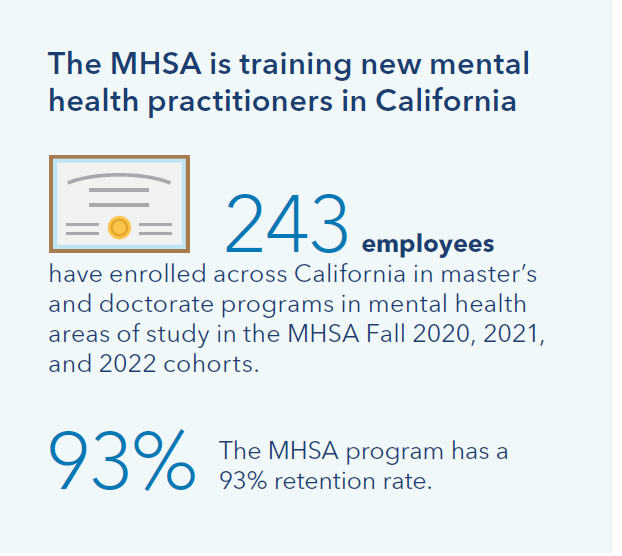
The Mental Health Scholars Academy program is helping expand the pipeline of mental health professionals in California
California lacks the mental health workforce capacity to meet the state’s current and growing needs. Adding to this challenge, the field is not racially, ethnically, and linguistically diverse enough to meet patient needs across the state.1

California’s mental health workforce is less diverse than California’s population
For almost all categories of mental health practitioners in California, the mental health professionals are less diverse than the state’s population.3

The Kaiser Permanente Mental Health Scholars Academy
To address the workforce shortage, Kaiser Permanente is working to hire and retain mental health professionals. One program helping expand the pipeline of highly qualified, diverse, accessible, and experienced mental health professionals in California is the Kaiser Permanente Mental Health Scholars Academy (MHSA), a $30 million workforce development initiative.
The MHSA launched in 2020 and offers eligible Kaiser Permanente employees the opportunity to pursue masters and doctorate degrees in mental health fields. The MHSA also provides continuing education for mental health professionals and is launching a new $5 million community based mental health workforce initiative in partnership with Kaiser Permanente Community Health, to expand the program to people not currently employed by Kaiser Permanente as well.
The program will continue over the next 3 years, and as the program expands, we will continue to measure retention rates, conduct periodic assessments of participants’ ability to make forward progress toward their degrees, and encourage a continuous increase in diversity across race, ethnicity, and languages. We are glad to be able to help educate, support, and provide consistent opportunities for training and exposure so more students can join the mental health workforce.
The MHSA program, and ongoing hiring and retention activities, are important steps to increase and diversify the mental health care workforce. In addition, public policy is needed to address the challenge at scale in California and across the country. We are committed to expanding the mental health workforce with a focus on equity, inclusion, and diversity – to provide readily accessible, culturally responsive, equitable care.


References
- Coffman, Janet, et al. “California’s Current and Future Behavioral Health Workforce.” Healthforce Center at UCSF, February 12, 2018, https://healthforce.ucsf.edu/publications/california-s-current-and-future-behavioral-health-workforce.
- Coffman, Janet, et al. “California’s Current and Future Behavioral Health Workforce.” Healthforce Center at UCSF, February 12, 2018, https://healthforce.ucsf.edu/publications/california-s-current-and-future-behavioral-health-workforce.\
- Coffman, Janet. “An Overview of California’s Behavioral Health Workforce,” Healthforce Center at UCSF, July 12, 2022, https://hcai.ca.gov/wp-content/uploads/2022/07/Agenda-Item-9-HCAI-HWET-Council-07-12-2022_Final-ADA-Accessible.pdf, and “Quickfacts: California,” United States Census Bureau, July 1, 2022, https://www.census.gov/quickfacts/fact/table/CA/PST045222.